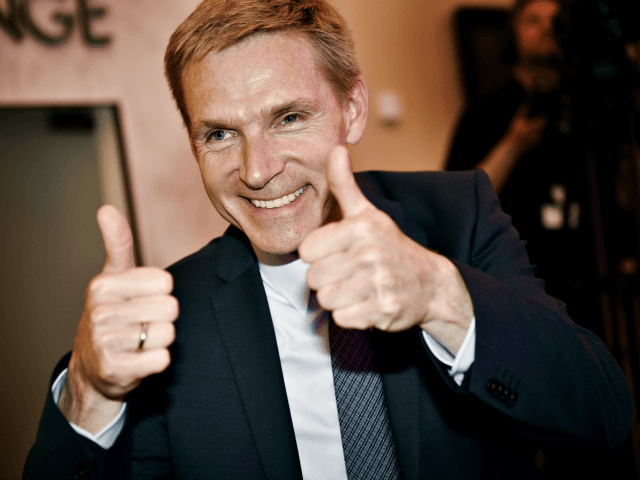Eurosceptic EU member Denmark voted in a referendum Thursday to reject a government proposal to adopt the bloc’s justice rules, amid concerns over handing more power to Brussels.
The ‘No’ side received 53.1 per cent of votes, while the ‘Yes’ camp garnered 46.9 per cent, final results showed. Voter turnout stood at 72 per cent.
“It is a clear no… I have full respect for the Danes’ decision,” Prime Minister Lars Lokke Rasmussen said at a press conference.
The ‘No’ side was led by the eurosceptic, anti-immigration Danish People’s Party (DPP — led by Kristian Thulesen Dahl pictured above), which argued that dropping the country’s exemptions on EU justice rules — which it negotiated with Brussels in 1993 as a condition for accepting the Maastricht Treaty — would hand too much power to Brussels and could result in more immigration.
The ‘Yes’ camp had focused on the need for international coordination in the fight against jihadism, which it argued was highlighted by last month’s carnage in Paris that left 130 dead.
The vote was Denmark’s eighth referendum on its relationship with Europe since joining the EU in 1972, and the outcome was virtually identical to a referendum in 2000 on adopting the euro, when the ‘No’ camp won with 53.2 percent.
The Scandinavian country will now have to negotiate a special agreement if it is to stay inside the EU’s law enforcement agency Europol, which tackles organised crime, trafficking and terrorism.
Acknowledging his government’s loss in the referendum, Rasmussen said he would meet with Danish party leaders on Monday to discuss how to move forward.
He said he would travel to Brussels on December 11 to meet with European Commission head Jean-Claude Juncker and European Council President Donald Tusk.
By maintaining its opt-out on justice rules, Denmark is unable to stay in Europol when the legal status of the EU agency changes, as is expected next year.
“We will work very hard for the Danes to get the best possible agreement. But it will be difficult,” the group leader in parliament for the ruling right-wing Venstre party, Soren Gade, told news agency Ritzau.
The outcome meant it was time for “soul-searching” on the ‘Yes’ side, he added.
– ‘More EU? No thanks’ –
Voters were asked whether Denmark should replace its current blanket opt-out of EU justice rules with the kind of model used by Britain and Ireland, which choose whether or not to participate in some areas of EU policy on a case-by-case basis.
“The ‘No’ side’s strongest argument has been the issue of sovereignty,” Kasper Moller Hansen, a political science professor at the University of Copenhagen, told AFP.
“And there are many Danes who are very sceptical about more European integration,” he added.
Rasmussen’s right-wing government and four other political parties had insisted that a ‘Yes’ vote was the best way to ensure Denmark stayed in Europol, helping Danish police fight violent extremism and other cross-border crime.
It also wanted to adopt 22 EU laws on issues including cybercrime and debt recovery.
The DPP meanwhile sought to tap into fears that Denmark, if it voted ‘Yes’, could be forced to accept obligatory EU refugee quotas as Europe struggles to cope with a massive influx of people fleeing conflict and poverty in the Middle East, Africa and South Asia.
Denmark has some of Europe’s strictest immigration policies and has received far fewer asylum seekers this year than neighbouring Sweden or Germany.
A ‘Yes’ result would have meant the Danish parliament could adopt further EU justice legislation without consulting voters, although the government had pledged another referendum would be needed on any policies affecting immigration.
Around one in five voters were undecided in the week leading up to the vote, and some said they would vote ‘No’ because they were struggling to understand what the referendum was about.
Marlene Wind, a political science professor at the University of Copenhagen, said the ‘Yes’ side had focused too much on technicalities and regulations.
“Many people I’ve talked to say they feel completely intimidated,” she told AFP.
By contrast, the DPP has boiled down its message on campaign posters to: “More EU? No thanks.”



COMMENTS
Please let us know if you're having issues with commenting.